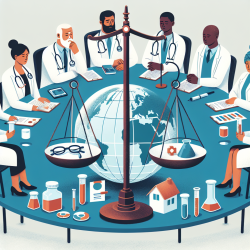The integration of human rights education within health sciences is crucial for developing healthcare professionals who are not only skilled but also ethically grounded. The study "Training Trainers in Health and Human Rights: Implementing Curriculum Change in South African Health Sciences Institutions" offers valuable insights into how educational reform can be achieved through targeted training programs.
The Need for Human Rights Education in Health Sciences
The historical context of apartheid in South Africa has left a legacy that underscores the need for human rights education. The Truth and Reconciliation Commission highlighted the complicity of the health sector in human rights violations during apartheid, prompting initiatives to incorporate human rights competencies into medical curricula. This move is not only a response to past injustices but also a proactive step towards ensuring that future healthcare professionals uphold ethical standards and advocate for patient rights.
The Train-the-Trainers Course: A Model for Curriculum Change
The Train-the-Trainers (TTT) course was established to equip educators with the skills necessary to teach human rights within health sciences. The course covers various themes, including curriculum development, institutional transformation, and leadership in teaching. Participants engage in practical activities such as role plays and case studies, which help them develop competencies that can be implemented at their institutions.
Key Outcomes of the Training
- Increased Implementation: Participants were nine times more likely to implement human rights education after completing the training.
- Diverse Educational Activities: Respondents reported implementing both formal curricula and extracurricular activities that promote human rights awareness.
- Institutional Support: Success was often facilitated by support from colleagues and institutional leaders, although barriers such as budget constraints and time limitations were noted.
Encouraging Further Research and Implementation
The findings from this study highlight the importance of continued research and advocacy for human rights education in health sciences. Practitioners are encouraged to explore similar training opportunities to enhance their teaching skills and contribute to curriculum reform. By fostering a network of informed educators, we can ensure that human rights remain a central component of healthcare education globally.










